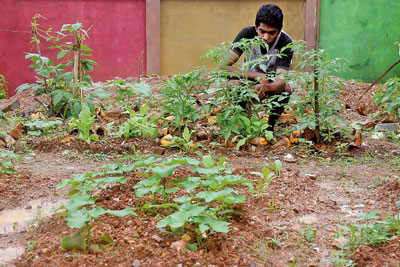News
Flat dwellers being inspired to stir the pot for communal meals
Recent political unrest and bankruptcy have worsened a severe food shortage and the majority of Sri Lankans are now forced to spend three times as much for basic essentials including rice and vegetables.
Largely self-sufficient in rice and vegetables, Sri Lanka was pushed down the precipice by President Gotabaya Rajapaksa, who defied advice and common sense and banned chemical fertiliser overnight in a forced switch to organic agriculture.
Soon agri yields crashed and paddy fields were decimated, causing unprecedented food shortages and staggering price rises. A stock of so-called liquid organic fertiliser turned out to be animal innards that attracted wild hogs and dogs to rice fields.
Now that essentials are scarce, people have to reshape and modify their old lifestyles and adopt different strategies. This is where the ‘community kitchen’ idea comes in.

Sandun tending his vegetable plot. Pic by Akila Jayawardana
Sandun Rohitha has been living in the ‘Sanhinda Sevana’ housing scheme in Kolonnawa for nearly two years now. A significant number of families, including Sandun had lost their homes due the collapse of the Meethotamulla garbage dump and were in dire straits. A group of five including Sandun and even small children have started a cultivation in a small plot in the housing scheme given to them by the government.
Despite all the economic, political and social hardships, Sandun and his team are putting their efforts into providing meals to more than 300 families in the housing scheme and they are hoping to start this as a ‘community kitchen’ next week.
“The people living in ‘Sanhinda Sevana’ have the ability to provide a non-toxic meal. There is potential, but we need the support of all. Some people living in this apartment complex do not support this. We must help each other and live in this crisis moment. A few of us started this small cultivation and now we are planning to prepare a meal in the small space we have,” Sandun said.

Sunil Jayantha
Small community kitchens have a grassroots impact on improving nutrition and reducing hunger in the neighbourhood, but a shift in mindset is required when it comes to discovering new ways to deliver food. These kitchens will be a safety net.
Sunil Jayantha, is also a resident of the Sanhinda Sevana housing scheme and he has a different view about people’s participation. He has been standing in gas queues for days.
“This is a good project to start with, but everyone living in this apartment complex should get involved. Or, this programme would stop in two to three days. Everyone must come together to prepare the basic facilities we need. This is a very difficult time for everyone, but to reduce it to some extent, everyone should change their attitude and get involved,” he said.
These people living in the flats and different housing schemes within Colombo and suburbs are being backed by Sarvodaya, Sri Lanka’s largest shramadana movement and independent experts who volunteered in framing policy of the community kitchen concept.
“At present we have identified about 37 apartments and we are currently providing them with the basic knowledge needed to start a community kitchen programme. Most of these apartments are home to about 3,000 families and it is difficult for people to organise such a thing. They need guidance to self-sustain and we are empowering them,” said Indunil Priyanga Hiththatiya, Sarvodaya Colombo district coordinator.
The community kitchen is not a welfare programme; rather, it focuses on how people are striving toward self-sufficiency and better themselves to share a meal with neighbours. The programme is focusing on four areas, apartments, the coastal community, estate settlements, and societies.
“Flats, slums and coastal belts also have societies and associations, but we are currently informing them of the need to start a food committee. That food committee starts with the community itself and it is based on how the community should work together in the face of this food crisis,” he said.
One could ask what is the difference between a common kitchen and a dansala. A dansala is a group which volunteers to donate food to a group of people. The main purpose of the common kitchen is that it is not about aid, but it is about everyone in the community joining. They could contribute either labour, money, surplus food etc., and through this, everyone will be able to save their labour, time and money, Kasun Indi, who is also volunteering in shaping up a community kitchen programme said.
“Rather than community kitchens, some individuals liked the notion of community cafeterias. We need to let that genuineness lead to the concept,” Kasun Indi said.
Social media platforms and ‘GotaGoGama’ are also venues where people discussed the idea of community kitchens and about spreading it.
Pathum Egodawatta, Kaushalaya Herath and Kasun Indi are among those volunteering in this pilot project.
“The key is the openness and flexibility of the concept and how it can take any shape based on the relevant community’s needs and the capacity. It can also grow as it goes by, tackling challenges and harnessing new opportunities,” said Kaushalya Herath, a PhD Student at University of Dundee who is also volunteering.
Another community kitchen targeting 500 families, is starting in Moratuwa next week and they are preparing a site.
“We are planning to start it next Saturday (June 4). We got the land from Sarvodaya to build the kitchen and we collaborated with them. This is for the Moratuwa area and we are posting a notice about the requirements,” Attorney-at-Law Kasun Jayaweera, a resident of Moratuwa said.
The best way to say that you found the home of your dreams is by finding it on Hitad.lk. We have listings for apartments for sale or rent in Sri Lanka, no matter what locale you're looking for! Whether you live in Colombo, Galle, Kandy, Matara, Jaffna and more - we've got them all!

